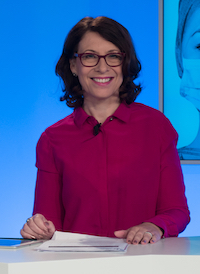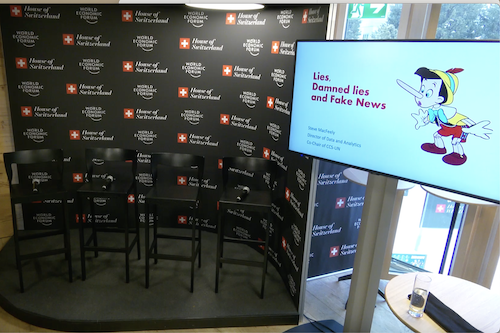When was the last time you heard a great keynote speech?
Many speakers use them to sell themselves or their organisation, neglecting to engage with the theme of the event.
Not so Dr Stephen Feeley, Chief Statistician at WHO, tasked with giving the keynote before a panel discussion I moderated on data governance and fake news at Davos last month.
A double-headed title for a panel discussion is always challenging as it can belie a lack of focus.
Dr Feeley took up the challenge and delivered a keynote that set up the panel discussion that was thought-provoking, entertaining and memorable.
So, what did he do?
- He had a clear objective – to inspire and unify the audience around a common purpose.
- He had a clear central argument – making the case for a global data governance framework.
- He understood the audience – pitching the level correctly so they were not bored nor confused but engaged in his thinking.
- He simplified the key message into a call to action so that the audience knew what was expected of them.
- He structured the speech by first talking about the problem before going to the solution.
- He hooked the audience with the specific – fake news – before going to the general – fake news as an example of the need for data governance.
Engaging hearts and minds
He knew what he wanted to say and presented it clearly and logically. But as the Greek philosopher Aristotle said if you want to persuade an audience you have to not only appeal to the logos, but also ethos (credibility) and pathos (stirring an emotion).
He established his credibility by explaining how WHO responded to fake news – misinformation and disinformation – during COVID.
He spoke from the heart telling us the world of fake news and alternative facts was undermining trust in science, and by extension in statistics, his area of expertise. This rejection of science he said could have serious implications for progress in tackling many of the challenges the world faces such as climate change.
He brought the subject alive through the use of stories, quotes and visually appealing slides.
Keynote speakers often forget the value of entertainment, but an audience needs to be entertained if you are to hold their attention for 15 minutes – just think of the typical TED talk.
And he had a great title – the key to getting the audience’s interest in the first place – lies, damned lies and fake news – is a riff on Mark Twain’s famous quote – lies, damned lies and statistics.
Often keynote speeches seem to be prepared in isolation and have little in common with the main theme of the event. But in this case, by working closely with the organisers and moderator, Dr Feeley’s speech set up the panel discussion brilliantly.
Author's bio
 Claire Doole is a former BBC correspondent and international spokeswoman who is passionate about helping people communicate with confidence. Since 2006, she has successfully trained hundreds of professionals in the art of presenting and public speaking, talking to the media, managing communications in a crisis, and writing for the web. In addition, she has coached C-level executives and public figures to give powerful TEDx and TED style talks in Europe and the Middle East. A Swiss and UK national, Claire trains and coaches in French and English.
Claire Doole is a former BBC correspondent and international spokeswoman who is passionate about helping people communicate with confidence. Since 2006, she has successfully trained hundreds of professionals in the art of presenting and public speaking, talking to the media, managing communications in a crisis, and writing for the web. In addition, she has coached C-level executives and public figures to give powerful TEDx and TED style talks in Europe and the Middle East. A Swiss and UK national, Claire trains and coaches in French and English.
Claire is also a highly experienced moderator having facilitated panel discussions with government ministers, NGO activists, humanitarians and human rights specialists at major events.
Claire helps clients design their virtual, hybrid and in-person events and runs workshops on organising and moderating at events.
www.doolecommunications.com


 Claire Doole is a former BBC correspondent and international spokeswoman who is passionate about helping people communicate with confidence. Since 2006, she has successfully trained hundreds of professionals in the art of presenting and public speaking, talking to the media, managing communications in a crisis, and writing for the web. In addition, she has coached C-level executives and public figures to give powerful TEDx and TED style talks in Europe and the Middle East. A Swiss and UK national, Claire trains and coaches in French and English.
Claire Doole is a former BBC correspondent and international spokeswoman who is passionate about helping people communicate with confidence. Since 2006, she has successfully trained hundreds of professionals in the art of presenting and public speaking, talking to the media, managing communications in a crisis, and writing for the web. In addition, she has coached C-level executives and public figures to give powerful TEDx and TED style talks in Europe and the Middle East. A Swiss and UK national, Claire trains and coaches in French and English.





